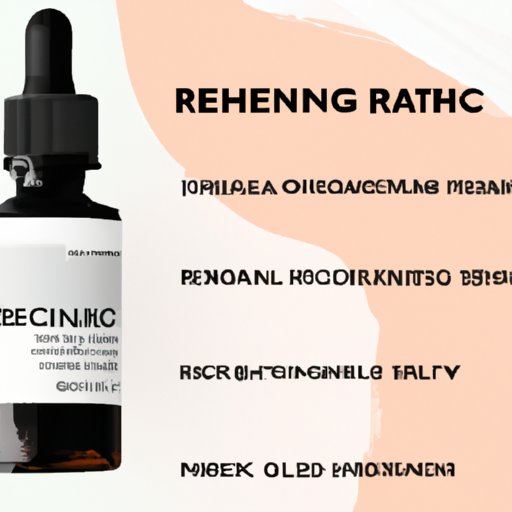To Retinol or Not to Retinol: Exploring the Safety of Topical Vitamin A during Pregnancy
If you’re pregnant and experiencing changes to your skin, you may be wondering if retinol – a popular skincare ingredient – is safe to use. While retinol has many benefits for the skin, it’s important to understand the risks associated with its use during pregnancy, especially in the first trimester.
Retinol is a form of Vitamin A that is widely used in skincare products because it can help reduce the appearance of fine lines and wrinkles, improve skin texture, and promote cell turnover. It’s also a popular ingredient for treating acne, as it can help unclog pores.
Retinol works by stimulating collagen production and increasing cell turnover, which helps to reduce the appearance of fine lines, wrinkles, and acne.
However, retinol use during pregnancy has been linked to birth defects, including malformations of the heart, face, and brain. While the risks associated with topical retinol use during pregnancy are still being studied, many experts recommend avoiding retinol in the first trimester and using caution throughout the rest of the pregnancy.
Several women have reported using retinol during pregnancy with no adverse effects, but the long-term effects of retinol use during pregnancy are still uncertain. It’s best to avoid using retinol during pregnancy unless directed by a healthcare provider.
Pregnancy Skincare Guide: The Do’s and Don’ts of Retinol Use
While you’re pregnant, it’s important to take care of your skin, as hormonal changes can lead to acne and other skin issues. However, it’s also important to be mindful of the products you use to avoid any potential risks to your developing baby.
There are many skincare products that are safe to use during pregnancy, including moisturizers, sunscreens, and gentle cleansers. Look for products that are free of retinol, salicylic acid, and other potentially harmful ingredients.
If you’re unsure about a product, check the label or consult with a healthcare provider who is knowledgeable about pregnancy-safe skincare products.
It’s also important to avoid any DIY skincare treatments that could potentially harm you or your baby. Stick to safe, gentle products that have been specifically designed for use during pregnancy.
When it comes to retinol, it’s best to err on the side of caution and avoid it during pregnancy. However, if you’re using a retinol product and become pregnant, talk to your healthcare provider before discontinuing use.
The Risks and Benefits of Using Retinol while Pregnant, According to Dermatologists
Many dermatologists recommend avoiding retinol use during pregnancy, as it has been linked to birth defects in animal studies. However, some experts argue that topical retinol use during pregnancy is unlikely to cause harm to the developing fetus in humans.
While the risks of using retinol during pregnancy are still being studied, many dermatologists advise their pregnant patients to use caution and avoid retinol in the first trimester.
There are many benefits to using retinol, including reduced fine lines and wrinkles, decreased hyperpigmentation, and improved skin texture and tone. However, these benefits must be weighed against the potential risks to the developing fetus.
If you’re pregnant and considering using a retinol product, it’s important to discuss your options with a healthcare provider. They can help you determine what is best for you and your baby.
Alternatives to Retinol for Pregnant Women Looking to Maintain Clear Skin
Vitamin A is an important nutrient for skin health, and there are many alternative skincare ingredients that can help maintain clear skin during pregnancy.
Niacinamide is a form of Vitamin B3 that has been shown to be effective in reducing inflammation and improving skin texture. It’s a safe alternative to retinol for pregnant women looking to reduce the appearance of fine lines and wrinkles.
Glycolic acid is a type of alpha-hydroxy acid that gently exfoliates the skin, making it a great alternative for pregnant women looking to improve skin texture and tone.
Hyaluronic acid is a humectant that helps to hydrate the skin, and it’s a safe option for pregnant women looking to boost skin moisture without the use of retinol.
When choosing skincare products during pregnancy, it’s important to read product labels carefully and avoid any ingredients that are not safe for use during pregnancy. Always consult with a healthcare provider before using any new skincare product.
Navigating Your Skincare Routine During Pregnancy: Can Retinol Be Included?
If you’re pregnant and looking to maintain clear, healthy skin, it’s important to prioritize safe skincare practices. This means avoiding ingredients that could potentially harm you or your developing baby, including retinol.
While the risks associated with topical retinol use during pregnancy are still being studied, many healthcare providers recommend avoiding retinol in the first trimester and using caution throughout the rest of the pregnancy.
If you’re using a retinol product and become pregnant, talk to your healthcare provider before discontinuing use. They can help you determine the best course of action for you and your baby.
There are many alternative skincare ingredients that are safe for use during pregnancy, including niacinamide, glycolic acid, and hyaluronic acid. These ingredients can help maintain clear, healthy skin without the potential risks associated with retinol use.
Conclusion
In conclusion, retinol use during pregnancy is a topic that continues to be studied by experts in both the skincare and medical fields. While the risks associated with retinol use are still uncertain, many experts recommend avoiding retinol in the first trimester and using caution throughout the rest of the pregnancy.
When it comes to pregnancy skincare, it’s important to choose products that are safe for you and your developing baby. Stick to gentle, pregnancy-safe products that are free of potentially harmful ingredients like retinol and salicylic acid.
Always read product labels carefully and consult with a healthcare provider before using any new skincare product during pregnancy. By prioritizing safe skincare practices, you can maintain clear, healthy skin while protecting your developing baby.
